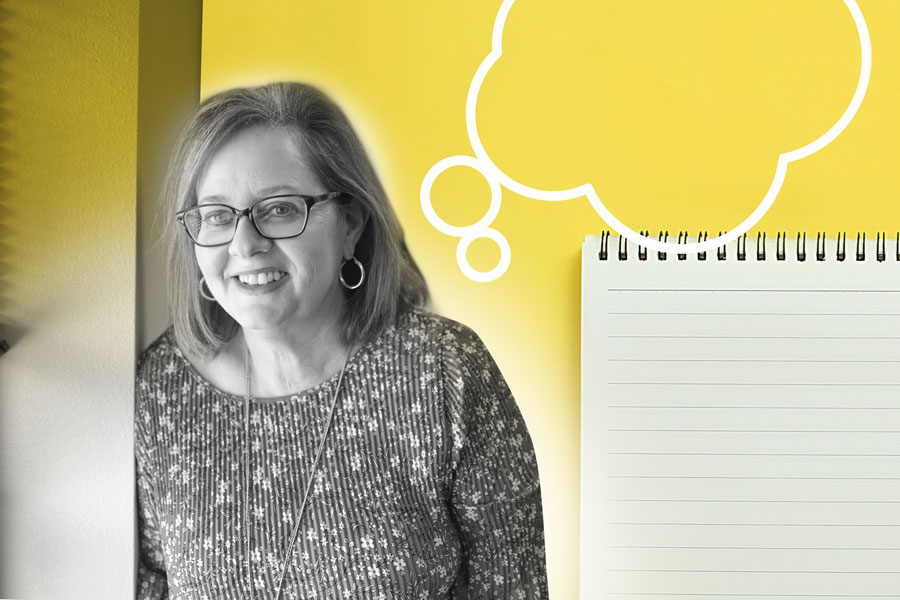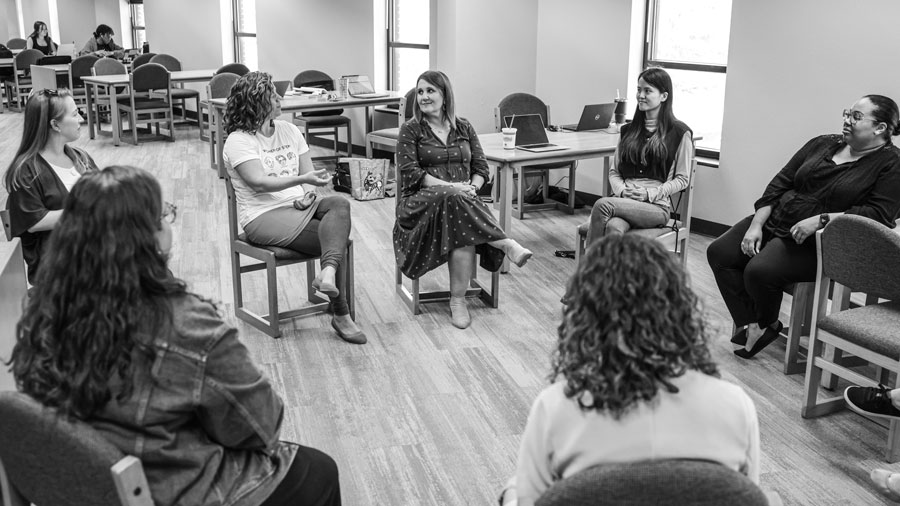A Room of Their Own
A popular program created to foster writing and research among Baylor’s female faculty is expanding its focus
Dr. Kara Poe Alexander is very busy filling multiple roles at Baylor. She’s director of the University Writing Center, which is administered by the College of Arts & Sciences, as well as a professor of English in the Professional Writing and Rhetoric program. The combination of those two jobs makes up half of her expected workload, while the other half of her workload is devoted to doing research.
“I could spend 40 hours a week alone just on the Writing Center,” she said, “and that’s only a fourth of my job.”
That’s why Alexander is grateful for the three hours each week she spends at the Women’s Faculty Writing Program — a dedicated time set aside for female faculty members from across Baylor University to come together and concentrate on their scholarly activities, including academic writing and research.
“The writing program really helps relax me and takes the anxiety away knowing I’m going to get these hours to write this week,” she said.
Meeting a Need
Dr. Lisa Shaver, also a professor of English involved with the Professional Writing and Rhetoric program, founded Baylor’s Women’s Faculty Writing Program in 2017. Shaver had heard about the success of a similar effort at another university while she was attending the Texas Women in Higher Education conference in San Marcos that year.
“Lisa and I were both really energized by this idea. We were both associate professors at the time,” Alexander said.
While Shaver was attending a workshop back at Baylor during that same summer, she learned that a study of women faculty at the University showed only 18% of the full professors — the highest faculty position — at Baylor at the time were women.
“Both of those experiences came together for me, and I thought, ‘We could use a women’s faculty writing program here to address that,” Shaver said.
“Whether someone’s focus is on getting promoted or not, there’s also the need for women to contribute to academic knowledge in their fields.” –Dr. Lisa Shaver
Shaver approached Dr. Lenore Wright in Baylor’s Academy for Teaching and Learning to identify some female faculty members who might benefit from such a program. The initial cohort began meeting in the fall of 2017 for three hours each Friday afternoon.
“Most of the time we would be writing,” Shaver said. “We’d stop and talk for 15 minutes, but the main thing everybody wanted was just concentrated writing time.”
Shaver noted that multiple activities can fall under the term “writing.”
“It’s anything that involves writing or getting you ready to write,” she said, including doing research, data analysis, revising, editing or working on a bibliography.
“It has to be writing that is related to scholarly work and is moving you toward promotion,” Shaver said. So far, around 15 women faculty members who have participated in the writing program have been promoted to full professor.
Shaver said that while the program maintains a focus on helping women address some of the challenges in the Academy, including publishing and promotion, “whether someone’s focus is on getting promoted or not, there’s also the need for women to contribute to academic knowledge in their fields,” she said.
A Way to Meet Others
Dr. Theresa Kennedy joined the women’s writing program in 2018 when she was an associate professor in French, and two years later in 2020 she earned a promotion to professor.
“The program has been an invaluable resource for me,” said Kennedy, who also is director of Baylor’s Women’s and Gender Studies program. “I have found more time to write during even the busiest times of the semester. I have made friends and gotten to know more women faculty across the campus.”
That ability to meet women faculty in other departments was one of the initial goals of the program, Shaver said. “Building these types of networks across the University can be a valuable resource. We also learn about other disciplines and departments.”
About 70 women now take part in the Women’s Faculty Writing Program. During the 2022-2023 academic year, it expanded to include full professors as well as assistant professors (who are working to achieve tenure with a promotion to associate professor). Often, with assistant professors on the tenure track, “they’re told to keep their head down and focus on getting tenure,” Shaver said.
“They don’t get to know many people outside their department. In some departments, there may not be any other women, or the women may be 20 or 30 years older than them, and there's really no one at their same life stage,” Shaver said. “So, taking part in the writing program is a good way for these women to meet other women across the campus.”
Easier to Concentrate
Writing program participant Dr. Deirdre Fulton, associate professor of religion, said that “providing an alternative space to write has made it possible for me to concentrate on my own writing projects during busy periods of the semester.
“There are many weeks that had I remained in my office, I would have used the time for other work demands. I’ve appreciated the time to focus on my own writing, surrounded by supportive Baylor faculty,” she said.
Alexander believes that writing groups open to women, such as the one at Baylor, are important for the emotional and mental health and well-being of those who take part.
“Women need to have a space where they can feel free to share whatever they want to with other women who are also experiencing, or know someone who has experienced similar challenges on campus,” she said. “It provides a sounding board.”
While writing is the main focus of the three-hour meetings, the short break needed to check in is just as important, Alexander said.
“That has been proven to be just so amazing in terms of encouragement and networking,” she said. “We really want to celebrate publications or grant proposals getting sent out, or promotions or any big news related to research and writing. And then we also share challenges. It could be things about Baylor that are challenging, such as not understanding Baylor’s grant proposal process. We’re asking each other such things as, ‘Can you help me make sense of this? Can you help me understand what I could do better to get this proposal through?’”
Each meeting of the writing group is led by a facilitator who helps keep participants on track, especially during that check-in time.
“The goals are to share successes and to share challenges related to research,” Alexander said. “It's not a space for a venting session because we say there are other times and other groups for that.”
Expanded Focus
While the writing group started as a grassroots effort to build community among female faculty, the program is now open to all faculty members across the University. The College of Arts & Sciences supports the efforts by paying its facilitators an honorarium, providing a stipend to Shaver as the program’s coordinator, and funding additional programing such as the end-of-year luncheon and summer bootcamp.
Dr. Sara Perry, associate professor of management in the Hankamer School of Business, has been part of the writing program for several years.
“It provides an unparalleled opportunity to dedicate time and attention to my research on a weekly basis,” she said. “The space we use in Jones Library has become a symbol of productivity and protection from all of the other demands we each have in our jobs.”


